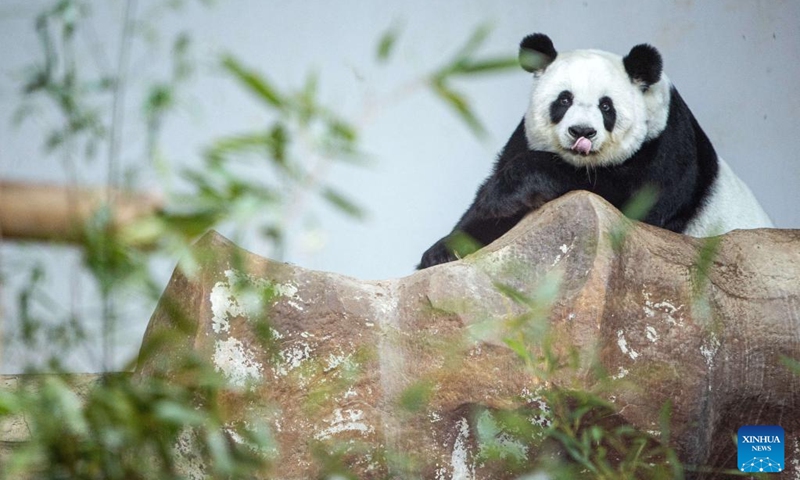
Giant panda Lin Hui rests at Chiang Mai Zoo in Chiang Mai, Thailand, Dec. 23, 2022. Lin Hui arrived in Chiang Mai on loan from China at the age of two in 2003. (Xinhua/Wang Teng)
Giant panda Lin Hui, the 21-year-old star attraction at Chiang Mai Zoo in Thailand, has died of multiple organ failure caused by atherosclerosis and embolism. The diagnosis was made after pathologic and etiological examination by a joint team of experts from China and Thailand, the China Conservation and Research Center for the Giant Panda said in a statement on Tuesday.
Lin Hui passed away on the morning of April 19 after fainting suddenly the day before. The zoo announced that Lin Hui first showed unusual symptoms on April 18 and was given a close examination, the Bangkok Post reported.
In a video taken by a tourist who visited the zoo on Tuesday, Lin Hui was seen lying feebly on the ground with blood stains on her nose and neck. She also seemed a bit nauseous, the tourist said in the video.
Upon learning the news, experts at the China Conservation and Research Center for the Giant Panda immediately reached the zoo to guide medical rescue efforts for the panda, but regrettably they were unable to save her life, Chinese Foreign Ministry spokesperson Wang Wenbin said at a press briefing.
The Chinese side attached great importance to the death of Lin Hui and urgently deployed experts to Thailand to investigate the cause of death, read the statement on the website of the China Conservation and Research Center for the Giant Panda.
Experts concluded that the elderly panda had died of multiple organ failure due to atherosclerosis and embolism. The nosebleed seen in the video was caused by hemangioma in her nasal cavity and contamination in other parts of her fur.
Chinese experts also conducted a thorough and detailed assessment of the facilities, medical team, food management, health system and diet management of the Chiang Mai Zoo where Lin Hui lived, and confirmed that it meets the requirements for giant panda breeding management and disease prevention and control.
Lin Hui was born in China on September 28, 2001. She was sent to Chiang Mai Zoo on October 12, 2003 as a goodwill ambassador between the two countries. She was scheduled to return to China this year.
Under the loving care of Chinese and Thai professionals, she has brought much joy to the Thai public over the years and has played an active role in promoting China-Thai cooperation in giant panda conservation and civil exchanges, Wang noted.
The Bangkok Post said Lin Hui was an instant star attraction. More than 7.4 million visitors have visited the zoo since October 2003 to see Lin Hui and Chuang Chuang, the two giant pandas on loan from China, according to the zoo director.
Since the launch of the China-Thailand Giant Panda research project 20 years ago, the two sides have achieved positive results in the protection and breeding of endangered species, as well as disease prevention and control, public education and other aspects, making positive contributions to the friendship between the two countries.
Both China and Thailand deeply regret the loss of Lin Hui, and the two countries will work together to deal with the aftermath of it, the China Conservation and Research Center for the Giant Panda noted.
Global Times




